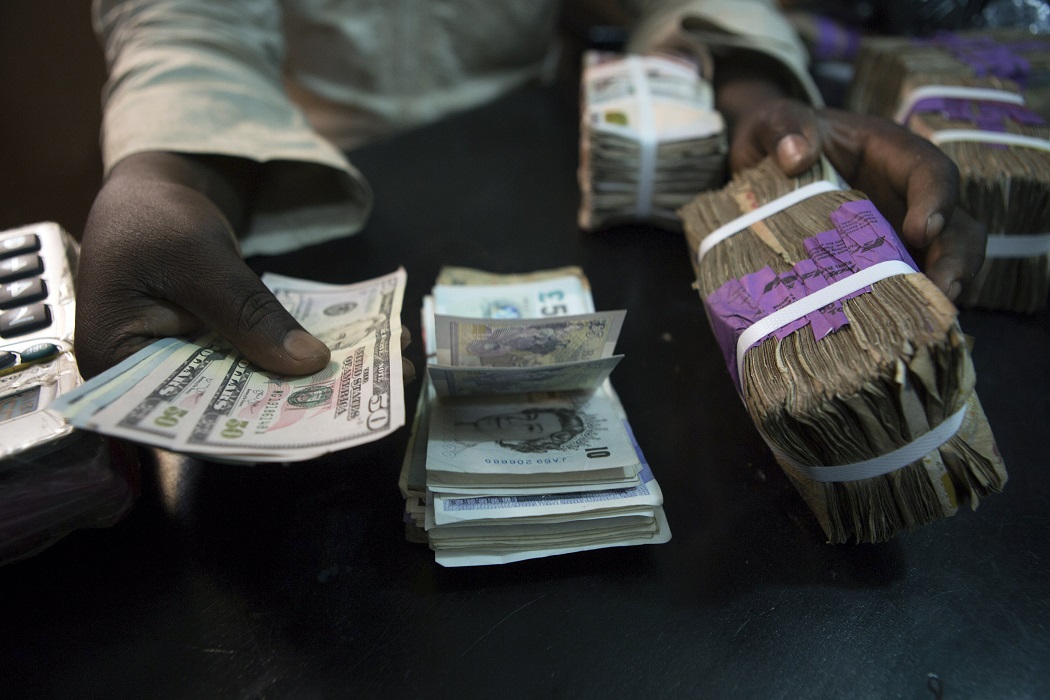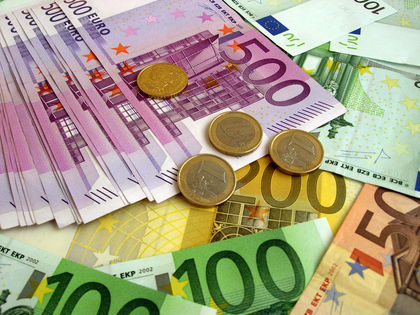Economy
Nigeria: Broad Money Grows 6.51% in December 2016


By Modupe Gbadeyanka
Central Bank of Nigeria (CBN) Depository Corporations Survey has shown that broad money supply (M2) expanded month-on-month by 6.51 percent in December 2016 to N23.84 trillion, a report by Cowry Asset has revealed.
It was gathered that the increase in M2 followeda0.70 percentincreaseinNet Domestic AssetstoN14.38trillion, accompanied by a 16.98 percent decrease in Net Foreign Assets to N9.35trillion.
The increase in net foreign assets partly reflected recovery in international crude oil prices since October last year juxtaposed with improved crude oil production.
Narrow money supply, M1, increased by 10.46 percent to N11.52 trillion as demand deposits grew by 9.69 percent to N9.70 billion and currency outside the banks increased by 14.70 percent to N1.82 trillion.
Also, net domestic credit upped by 0.45 percent to N26.97 trillion as credit to the private sector declined by 2.91 percent to N22.37 trillion while credit to the government increased by 20.85 percent to N4.60 trillion; which was indicative of crowding out of the private sector in a high interest rate environment.
In the real sector, Nigeria’s economy recorded sustained increase in annual inflation rate, to 18.72 percent in January 2017 (from 18.55 percent in December 2016).
However, monthly increase in composite consumer price index slowed to 1.01 percent in the review month (from 1.06 percent in December).
Increase in general price level was partly due to increased pressure from higher foreign exchange rates and their subsequent impact on consumer goods and services –Naira/USD exchange rates increased month-on-month by 1.78 percent and 1.63 percent to average N490/USD and N495.38/USD at the Bureau De Change and Parallel market segments respectively.
Similarly, the prices of refined petroleum products increased on a monthly basis–Premium Motor Spirit increased by 1.36 percent to average N148.7/litre; Automotive Gas Oil increased by 22.59 percent to average N240.52/litre; Household Kerosene spiked by 87.12 percent to average N433.84/litre; while average price for Liquefied Petroleum Gas increased by 22.91 percent to N5,500 per 12.50kg refill.
Food inflation rate rose to 17.82 percent in January (faster than 17.39 percent in December), driven by increases in prices of bread and cereals, meat oil and fats, and fish.
However, core inflation rate fell to 17.90 percent in January (from 18.10 percent in December).
The price index of housing water, electricity, gas and other fuel grew by 27.17 percent in January (slower than 27.25 percent in December); imported food index rose by 20.97 percent in January (slower than 21.08 percent in December); while transportation index increased at a faster pace by 17.22 percent in January (from 17.30 percent in December).
The clothing and footwear price index also increased at a faster pace by 17.85 percent in January (from 17.81 percent in December).
On the foreign scene, inflation rate in the United States increased year-on-year to 2.5 percent in January 2017 (higher than 2.1 percent recorded in December; above market expectations of 2.4 percent and higher than 2.0 percent target set by the Federal Open Markets Committee), mainly driven by gasoline prices.
In the same vein, inflation rate in the United Kingdom increased to 1.8 percent in January 2017 (higher than 1.6 percent in December, but below mark expectations of 1.9 percent), mainly driven by rising cost of fuel.
Consumer prices in China also increased year-on-year by 2.5 percent in January 2017 (higher than 2.1 percent recorded in December), driven by a faster increase in cost of food and non-food items.
The annual inflation rate in Ghana slowed to 13.3 percent in January (from 15.4 percent in the previous month), driven by slower increase in prices of food and non-food items (7 percent from 9.7 percent and 16.6 percent from 18.2 percent respectively).
View full report here: Cowry Asset
Economy
Champion Breweries Concludes Bullet Brand Portfolio Acquisition

By Aduragbemi Omiyale
The acquisition of the Bullet brand portfolio from Sun Mark has been completed by Champion Breweries Plc, a statement from the company confirms.
This marks a transformative milestone in the organisation’s strategic expansion into a diversified, pan-African beverage platform.
With this development, Champion Breweries now owns the Bullet brand assets, trademarks, formulations, and commercial rights globally through an asset carve-out structure.
The assets are held in a newly incorporated entity in the Netherlands, in which Champion Breweries holds a majority interest, while Vinar N.V., the majority shareholder of Sun Mark, retains a minority stake.
Bullet products are currently distributed in 14 African markets, positioning Champion Breweries to scale beyond Nigeria in the high-growth ready-to-drink (RTD) alcoholic and energy drink segments.
This expansion significantly broadens the brewer’s addressable market and strengthens its revenue base with an established, profitable portfolio that already enjoys strong brand recognition and consumer loyalty across multiple markets.
“The successful completion of our public equity raises, together with the formal close of the Bullet acquisition, marks a defining moment for Champion Breweries.
“The support we received from both existing shareholders and new investors reflects strong confidence in our long-term strategy to build a diversified, high-growth beverage platform with pan-African scale.
“Our focus now is on disciplined execution, integration, and delivering sustained value across markets,” the chairman of Champion Breweries, Mr Imo-Abasi Jacob, stated.
Through this transaction, Champion Breweries is expected to achieve enhanced foreign exchange earnings, expanded distribution leverage across African markets, integrated supply chain efficiencies, portfolio diversification into high‑growth consumer beverage categories, and strengthened presence in the RTD and energy drink segments.
The acquisition accelerates Champion Breweries’ transition from a regional brewing business to a multi-category consumer platform with continental reach.
Bullet Black is Nigeria’s leading ready-to-drink alcoholic beverage, while Bullet Blue has built a strong presence in the energy drink category across several African markets.
Economy
M-KOPA Nigeria Plans Expansion to Edo, Others After N231bn Credit Milestone

By Adedapo Adesanya
Emerging market fintech firm, M-KOPA, has announced plans to deepen its reach in Nigeria to the South South and South East regions, starting with Edo this year, after providing N231 billion in credit to over 1 million customers in the country.
The firm released its first Nigeria-focused Impact Report, which showed that Nigeria is M-KOPA’s fastest-growing market and fastest to reach the milestone.
Since its foray into the Nigerian market in 2019, M-KOPA has been working to dismantle barriers to financial inclusion by providing flexible smartphone financing and digital financial tools that align with how people in the informal economy earn and manage their money.
It operates in six states in the country, including Lagos, Ogun, and Oyo, among others.
The report highlights the company’s contribution to income generation, digital inclusion and economic opportunity for Every Day Earners across the country.
The report showed that M-KOPA has enabled 290,000 first-time smartphone users, while 56 per cent of agents accessed their first income opportunity through the platform.
It showed high income and livelihood gains among its users, with about 77 per cent of customers leveraging smartphones or digital loans obtained through the platform to generate income, indicating that access to financed devices is directly supporting micro-entrepreneurial activity and informal sector productivity.
Furthermore, 75 per cent of users report higher earnings since gaining access to M-KOPA’s services, suggesting measurable improvements in personal revenue streams. On the distribution side, 99 per cent of agents disclose increased earnings, reflecting positive spillover effects across the company’s value chain.
In addition, 81 per cent of long-term customers state that their household expenses have improved, pointing to enhanced financial stability and better consumption smoothing over time.
Speaking on the report, Mr Babajide Duroshola, General Manager, M-KOPA Nigeria, said, “Nigeria represents extraordinary potential, and we’re proud that it has become M-KOPA’s fastest-growing market. Our Impact Report shows that when Every Day Earners gain access to the right digital and financial tools, they use them to create stability and long-term progress for their families. This is about access that unlocks opportunity and sustained prosperity.”
On its expansion plans Nigeria-wide, the M-KOPA helmsman said, “Many of the states we are considering are already similar to the ones we are currently in proximity… So, there is proximity and similarity between these states, and that’s what we are going to do, starting with Edo.”
He noted that as M-KOPA Nigeria continues to expand, the focus remains on ensuring more everyday earners gain access to the digital and financial tools they need to build resilient, prosperous futures in Nigeria’s rapidly digitising economy.
Economy
Tinubu Okays Extension of Ban on Raw Shea Nut Export by One Year

By Aduragbemi Omiyale
The ban on the export of raw shea nuts from Nigeria has been extended by one year by President Bola Tinubu.
A statement from the Special Adviser to the President on Information and Strategy, Mr Bayo Onanuga, on Wednesday disclosed that the ban is now till February 25, 2027.
It was emphasised that this decision underscores the administration’s commitment to advancing industrial development, strengthening domestic value addition, and supporting the objectives of the Renewed Hope Agenda.
The ban aims to deepen processing capacity within Nigeria, enhance livelihoods in shea-producing communities, and promote the growth of Nigerian exports anchored on value-added products, the statement noted.
To further these objectives, President Tinubu has authorised the two Ministers of the Federal Ministry of Industry, Trade and Investment, and the Presidential Food Security Coordination Unit (PFSCU), to coordinate the implementation of a unified, evidence-based national framework that aligns industrialisation, trade, and investment priorities across the shea nut value chain.
He also approved the adoption of an export framework established by the Nigerian Commodity Exchange (NCX) and the withdrawal of all waivers allowing the direct export of raw shea nuts.
The President directed that any excess supply of raw shea nuts should be exported exclusively through the NCX framework, in accordance with the approved guidelines.
Additionally, he directed the Federal Ministry of Finance to provide access to a dedicated NESS Support Window to enable the Federal Ministry of Industry, Trade and Investment to pilot a Livelihood Finance Mechanism to strengthen production and processing capacity.
Shea nuts, the oil-rich fruits from the shea tree common in the Savanna belt of Nigeria, are the raw material for shea butter, renowned for its moisturising, anti-inflammatory, and antioxidant properties. The extracted butter is a principal ingredient in cosmetics for skin and hair, as well as in edible cooking oil. The Federal Government encourages processing shea nuts into butter locally, as butter fetches between 10 and 20 times the price of the raw nuts.
The federal government said it remains committed to policies that promote inclusive growth, local manufacturing and position Nigeria as a competitive participant in global agricultural value chains.
-

 Feature/OPED6 years ago
Feature/OPED6 years agoDavos was Different this year
-
Travel/Tourism10 years ago
Lagos Seals Western Lodge Hotel In Ikorodu
-

 Showbiz3 years ago
Showbiz3 years agoEstranged Lover Releases Videos of Empress Njamah Bathing
-

 Banking8 years ago
Banking8 years agoSort Codes of GTBank Branches in Nigeria
-

 Economy3 years ago
Economy3 years agoSubsidy Removal: CNG at N130 Per Litre Cheaper Than Petrol—IPMAN
-

 Banking3 years ago
Banking3 years agoSort Codes of UBA Branches in Nigeria
-

 Banking3 years ago
Banking3 years agoFirst Bank Announces Planned Downtime
-

 Sports3 years ago
Sports3 years agoHighest Paid Nigerian Footballer – How Much Do Nigerian Footballers Earn















